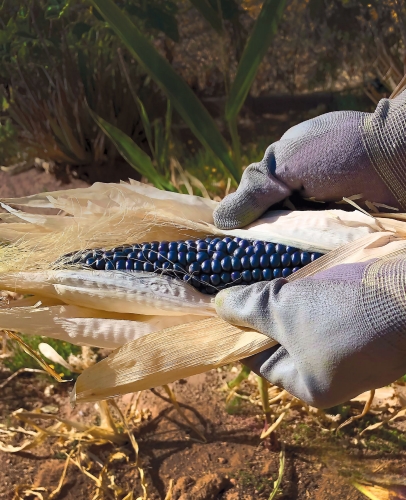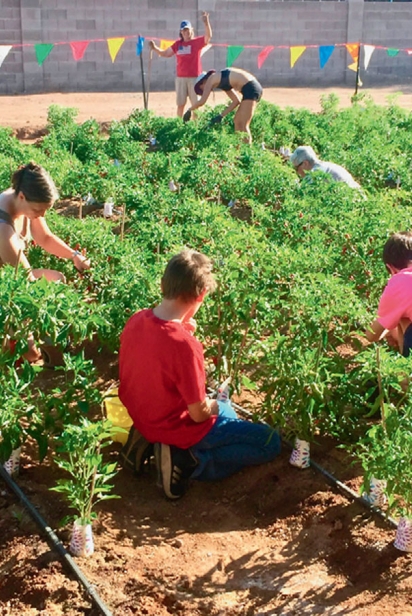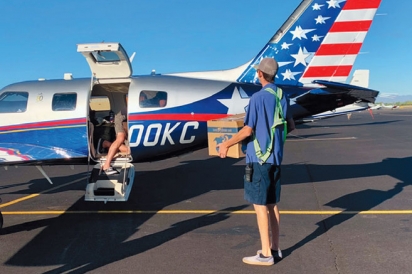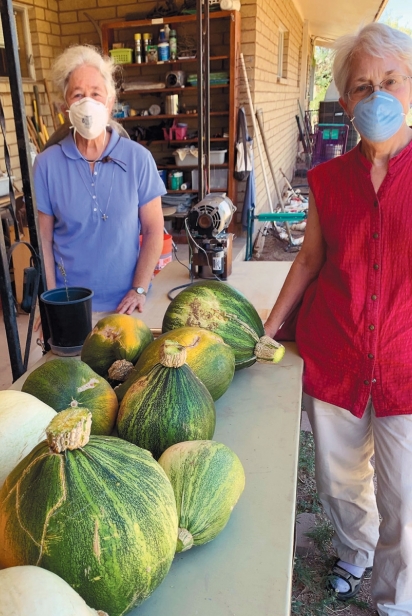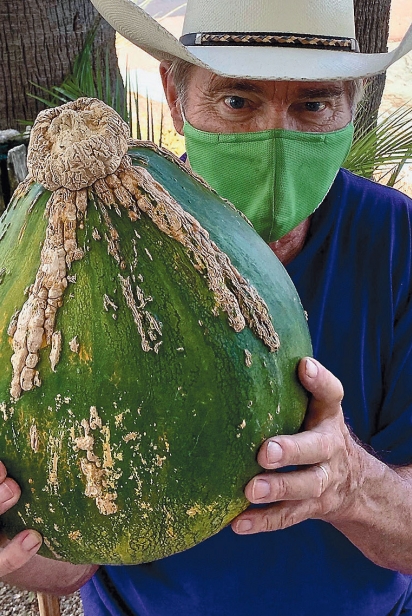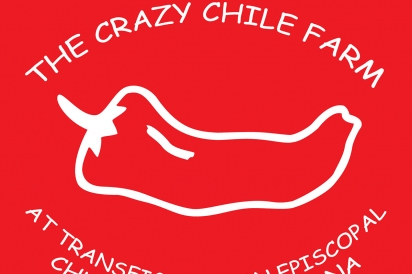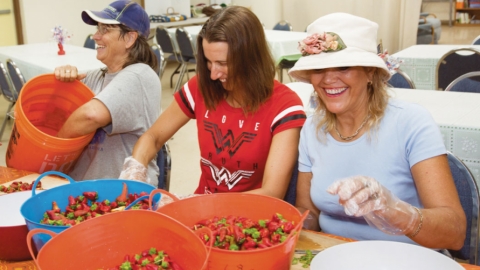The Crazy Chile Farm's Next Phase: Seed Distribution to Native Communities
When the Crazy Chile Farm got its start in 2014, the congregation at Transfiguration Episcopal Church in Mesa intended it to be a way to support the church’s food-related community outreach programs. But now, in addition to growing Chimayo chiles that volunteers dry, grind into chile powder and sell to the public, the farm has become a resource for growing out indigenous seed crops for distribution to tribal communities around the Southwest.
Seeds are a vital piece of the move to food sovereignty for Native people who have seen their food traditions damaged and destroyed, only to be replaced with fast food and ill health. “Traditional agriculture requires traditional crops, and many of those crops come from seeds that have been lost,” says Bill Robinson, the manager at Crazy Chile Farm. “So, we’re working with a lot of other people to recover those seeds and grow them out here.”
The importance of saving seeds, especially those adapted to the desert, can’t be overstated, especially for the Southwest’s desert-dwelling tribes. And it’s not just about feeding people. Nina Sajovec of the Ajo Center for Sustainable Agriculture, a nonprofit working to build a sustainable food system on the Tohono O’odham reservation and surrounding area near Ajo, says bringing back indigenous crops is also a cultural touchstone.
“Indigenous people are still here, growing and tending their crops. The idea is to teach people how to save seeds, but also to help them learn respect and appreciation for the cultures who have lived here for thousands of years.”
In the drought-prone deserts of the Southwest, dryland farming with seeds adapted to the practice is especially crucial. The genetics that allow plants to thrive and produce in spite of the extreme heat and lack of water are becoming more important for commercial farming, as well as for the immediate needs of tribal communities.
The Crazy Chile Farm—at about a quarter of an acre, more of a very large, very productive suburban garden—raises crops once typical of the area but now rare: Pima Sacaton brown tepary beans (S-oam Bavi), 60-day corn (Ki:kam Hu:un), sorghum (Kaña) and giant squash (Ha:L). This year, for the first time, they grew a plot of Supai red corn.
The farm is also the only source of Yoeme blue corn seed in the country. It’s extremely rare, but Robinson says it’s been their most successful indigenous grow-out. “It’s in very, very short supply. In fact, it’s so short that Native Seeds/SEARCH has it only in their seed bank,” he says. “We’ve only given it to three places.” Those include Native Health in Phoenix for their community garden; Old Pascua in Tucson, a Yaqui community; and Semalulukut Community Garden in Guadalupe, another Yaqui town on the edge of Tempe.
With the pandemic raging this past spring and summer, the importance of access to indigenous seeds became critical. For the remote Havasupai community at the bottom of the Grand Canyon, the virus made it impossible for farmers to get seeds for their spring planting. Supai Village is only accessible by river, trail or helicopter, but Crazy Chile Farm was able to step in and help. “All of their supplies go down by mule train,” says Robinson. “So we arranged through the U.S. Postal Service to deliver eight and a half pounds of seed at the beginning of the season this year because all of their farmers were sequestered with COVID-19 problems.”
Robinson found additional help with the project during a conversation he had with Terry Button of Ramona Farms, a Native-owned operation at the Gila River Indian Community. “He said, ‘You’re doing something for Supai. I know a lot of those guys. Wait a minute.’ He rumbled back into some warehouse at the farm and he comes out and he’s got a huge bag of red seed. He said, ‘This is Supai red. There ain’t very much of it around, but you can have it.’ So I sent all of that down to Supai Village. We were able to give them their own seed.”
The Hualapai Tribe, neighbor of the Havasupai, was also hit hard by the virus. Along with two other churches, Robinson says they reached out to Angel Flight West, a network of 1,400 private pilots around the Western U.S. who fly mercy missions, to arrange for 12 aircraft to ferry 2,500 pounds of seeds and supplies to the Hualapai from Falcon Field in Mesa. In addition, they trucked in 26 tons of alfalfa and livestock feed.
Closer to home, Robinson says they were able to grow 450 pounds of Tohono O’odham squash and delivered 300 pounds to Ajo and 150 pounds to Native Health for both emergency food relief and seed-saving.
The Crazy Chile Farm became involved in seed distribution after a chance meeting with Sajovec at an Arizona Department of Agriculture meeting in 2016. “We were all sitting at tables, and from behind me, I heard, ‘Psst. You want some seeds?’” says Robinson. Sajovec was trying to get a seed exchange going at the Ajo Center, and she gave Robinson his first batch of Sacaton brown tepary beans. Later, he went to a dryland farming seminar where he got seeds for other indigenous crops, and by Thanksgiving 2018 the Crazy Chile volunteers were able to return a truckload of squash and about four pounds of tepary bean seed stock to the Ajo Center.
Even though the land at the Crazy Chile Farm is limited to two fields and a greenhouse, Robinson has no intention of limiting the growth of the program. They’ve helped St. Andrew’s Episcopal Church in Sedona build their own chile farm, and next spring Epiphany Church in Tempe will see their first planting. Robinson has also spoken with a pastor in Ft. Defiance on the Navajo Nation.
The all-volunteer system is easy to replicate, and its simplicity is its greatest strength. “We can use money from the chiles to buy supplies for the things like the airlift,” says Robinson. “And we can use the seeds from chiles and everything else to distribute to a growing body of Native Americans. We can also work in subtle ways to be activists for Native nations to regain their full sovereignty.”
In the long term, Robinson says he has three goals. One is to continue to expand the seed distribution program and the allyship with Native Americans. He’s been networking with people around the Southwest and Midwest. Second, he’s adamant that Crazy Chile Farm be able to generate enough income to pay its bills. To that end, he’s been buying blue corn from the Ute Mountain Ute tribe and grinding it into cornmeal, which then gets sold to the public at a tidy profit. Finally, he says, “I have a huge, huge desire to have somebody else step in on a volunteer basis and run this thing because right now it can become a one man show, and I don’t want it to be that.”
Support Crazy Chile Farm
Even though the annual chile festival has been canceled this year, chile powder and blue corn meal are available by contacting Robinson at dwbrobinson@gmail.com.
The farm is a project of Episcopal Church of the Transfiguration, 514 S. Mountain Rd., Mesa, 85028; transfiguration-mesa.org.


